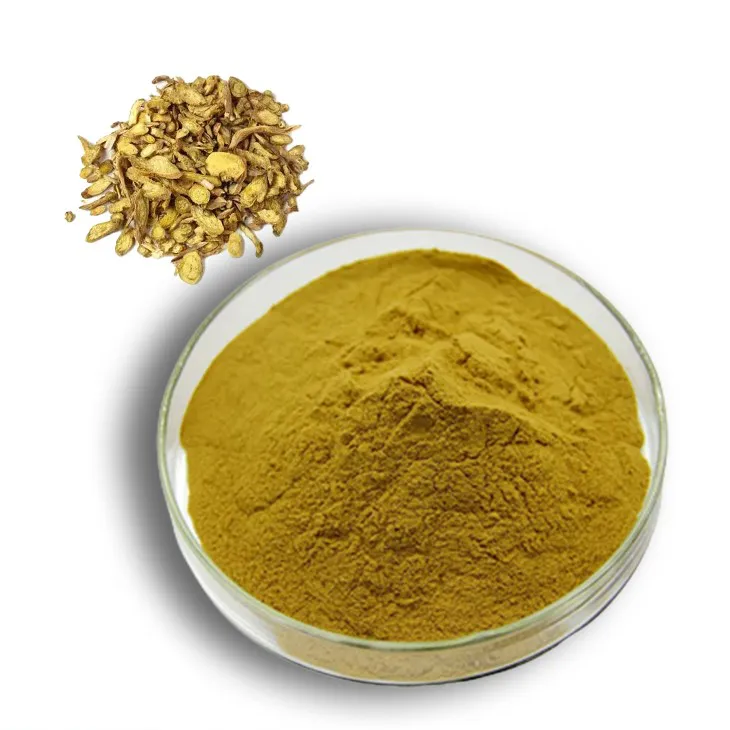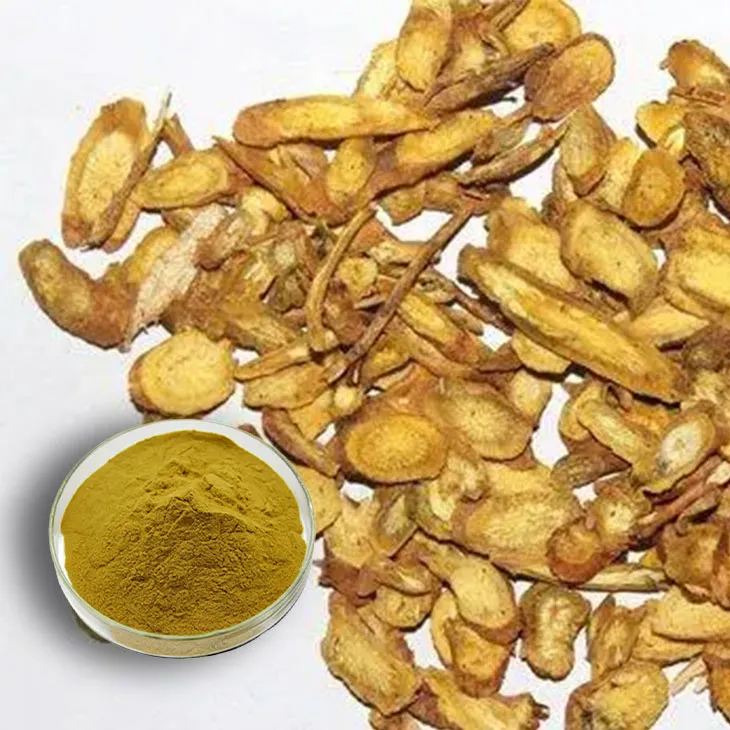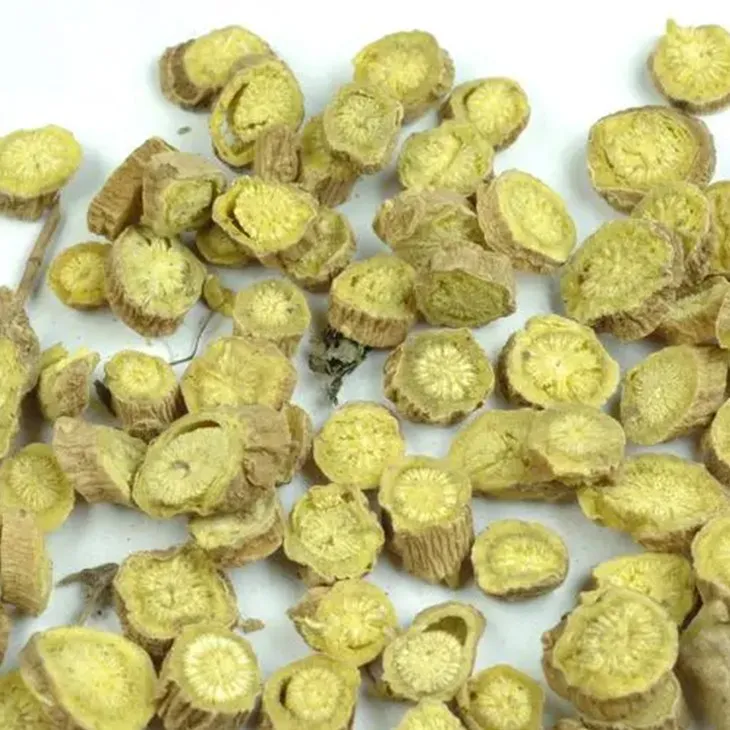- 0086-571-85302990
- sales@greenskybio.com
The Best Herb for Treating Anxiety and Insomnia: Baicalin.
2024-11-13

1. Introduction
Anxiety and insomnia are two widespread issues that have a significant impact on people's well - being and quality of life. In modern society, the fast - paced lifestyle, high - stress work environment, and various social pressures often lead to an increase in the prevalence of these problems. Many individuals are constantly seeking effective solutions to relieve anxiety and improve sleep quality. Among the numerous treatment options, Baicalin, an extract from a traditional herb, has emerged as a promising candidate.

2. Baicalin: An Overview
Baicalin is derived from Scutellaria baicalensis, a plant that has been used in traditional medicine for centuries. This plant has a rich history of medicinal use in different cultures, especially in Asian traditional medicine systems. Baicalin is one of the main active components isolated from this plant through modern extraction techniques.
It is a flavonoid compound with a unique chemical structure that endows it with various biological activities. These activities are the basis for its potential role in treating anxiety and insomnia.

3. Mechanisms of Action in Treating Anxiety
3.1 Anti - inflammatory Effects
One of the important mechanisms by which Baicalin may treat anxiety is through its anti - inflammatory properties. In the body, chronic inflammation can be an underlying factor contributing to anxiety disorders. There are multiple pathways through which inflammation can affect the brain and the nervous system.
For example, inflammatory cytokines can cross the blood - brain barrier and disrupt the normal functioning of neurotransmitter systems in the brain. Baicalin has been shown to inhibit the production and release of pro - inflammatory cytokines. By reducing inflammation, it can potentially relieve the internal stressors on the nervous system that are associated with anxiety.
3.2 Interaction with Neurotransmitter Systems
Baicalin also interacts with the body's neurotransmitter systems. Neurotransmitters play a crucial role in regulating mood and emotions. Imbalances in neurotransmitter levels, such as serotonin, dopamine, and gamma - aminobutyric acid (GABA), are often linked to anxiety disorders.
Studies have suggested that Baicalin may modulate the levels or activity of these neurotransmitters. For instance, it may enhance the function of GABA receptors. GABA is an inhibitory neurotransmitter that helps to calm the nervous system. By increasing GABAergic activity, Baicalin can potentially reduce anxiety symptoms.

4. Mechanisms of Action in Treating Insomnia
4.1 Regulation of Circadian Rhythm
The body's circadian rhythm is closely related to sleep - wake cycles. Disruptions in circadian rhythm can lead to insomnia. Baicalin may play a role in regulating the circadian rhythm. It can interact with the internal biological clock mechanisms in the body.
For example, it may affect the expression of certain clock genes that are involved in regulating the daily rhythms of physiological processes. By restoring or normalizing the circadian rhythm, Baicalin can help to promote a more regular sleep - wake cycle, thereby alleviating insomnia.
4.2 Influence on Neurotransmitter Levels for Sleep
Similar to its role in anxiety treatment, Baicalin also influences neurotransmitter levels relevant to sleep. In addition to GABA, other neurotransmitters such as melatonin are important for sleep regulation.
Baicalin may increase the production or release of melatonin, which is a hormone that regulates the sleep - wake cycle. Moreover, it can also adjust the balance of other neurotransmitters in the brain that are involved in promoting relaxation and sleep onset, such as serotonin. By optimizing these neurotransmitter levels, Baicalin can contribute to a more natural and restful sleep.

5. Comparison with Synthetic Medications
When it comes to treating anxiety and insomnia, synthetic medications are commonly used. However, these medications often come with a range of side effects.
Baicalin, on the other hand, has some advantages in this regard. Firstly, many synthetic anti - anxiety and sleep medications can cause drowsiness, dizziness, and cognitive impairment as side effects. In contrast, Baicalin is generally considered to have fewer such adverse effects. This makes it a more suitable option for those who need to maintain normal daily functioning while treating their conditions.
Secondly, long - term use of some synthetic medications may lead to tolerance, dependence, and withdrawal symptoms. Baicalin, being a natural compound, may have a lower risk of these issues. However, it is important to note that more research is still needed to fully understand the long - term effects of Baicalin use.
6. Current Research and Evidence
There has been a growing body of research on the potential of Baicalin in treating anxiety and insomnia. In vitro and in vivo studies have provided some initial evidence for its mechanisms of action.
Animal studies have shown that Baicalin - treated animals exhibited reduced anxiety - like behaviors and improved sleep quality. These studies have allowed researchers to explore the physiological and biochemical changes associated with Baicalin treatment at a more detailed level.
Clinical trials in humans are also being carried out, although the number of such trials is still relatively limited. Preliminary results from some small - scale clinical trials suggest that Baicalin may have a positive impact on anxiety and insomnia symptoms in patients. However, larger - scale and more comprehensive clinical trials are required to further confirm its efficacy and safety.
7. Dosage and Administration
The appropriate dosage of Baicalin for treating anxiety and insomnia is still an area of ongoing research. Currently, different forms of Baicalin - containing products are available on the market, such as herbal extracts, capsules, and tablets.
It is important to follow the recommended dosage instructions provided by the manufacturer or healthcare provider. Dosage may vary depending on factors such as the individual's age, health condition, and the severity of the anxiety or insomnia symptoms.
In general, it is advisable to start with a relatively low dose and gradually increase it if necessary, while closely monitoring the body's response. Additionally, it is crucial to ensure the quality and purity of the Baicalin - containing product to ensure its safety and effectiveness.
8. Safety Considerations
Although Baicalin is generally considered safe, there are still some safety considerations to keep in mind.
- Allergic reactions: Some individuals may be allergic to Scutellaria baicalensis or Baicalin. Symptoms of allergic reactions may include skin rashes, itching, swelling, and in severe cases, difficulty breathing. People with a known history of allergies should be cautious when using Baicalin - containing products.
- Drug interactions: Baicalin may interact with other medications. For example, it may affect the metabolism of certain drugs in the liver. If an individual is taking other medications, it is important to consult a healthcare provider before starting Baicalin treatment to avoid potential drug - drug interactions.
- Pregnancy and breastfeeding: There is limited information regarding the safety of Baicalin use during pregnancy and breastfeeding. As a precaution, it is recommended that pregnant and breastfeeding women avoid using Baicalin - containing products unless under the guidance of a healthcare professional.
9. Conclusion
In conclusion, Baicalin shows great potential as a natural treatment for anxiety and insomnia. Its multiple mechanisms of action, including anti - inflammatory effects, interaction with neurotransmitter systems, and regulation of circadian rhythm, make it an attractive option for those seeking alternative or complementary therapies.
Compared to synthetic medications, it may have fewer side effects and a lower risk of tolerance and dependence. However, more research, especially large - scale clinical trials, is needed to fully establish its efficacy and safety. With further research and development, Baicalin may become an important part of the treatment arsenal for anxiety and insomnia in the future.
FAQ:
What is Baicalin?
Baicalin is an herb extract that is derived from Scutellaria baicalensis. It has a long - standing use in traditional medicine and has been found to have various beneficial properties through scientific research.
How does Baicalin treat anxiety?
Baicalin can treat anxiety by virtue of its anti - inflammatory properties. These properties help in reducing internal stressors within the body that are often associated with anxiety.
How does Baicalin help with insomnia?
For insomnia, Baicalin may regulate the body's circadian rhythm and neurotransmitter levels. By doing so, it promotes a more natural sleep cycle, which can be helpful for those suffering from insomnia.
Are there any side effects of Baicalin?
Compared to some synthetic medications, Baicalin often has fewer side effects. However, it is still important to consult a healthcare professional before using it, as individual reactions may vary.
Can Baicalin be used as a substitute for synthetic medications?
For those seeking relief from anxiety and insomnia, Baicalin can be a more natural and potentially safer option compared to some synthetic medications. But whether it can be a substitute depends on various factors such as the severity of the condition and individual health profiles. It is advisable to consult a doctor before making any substitution.
Related literature
- The Efficacy and Safety of Baicalin in the Treatment of Anxiety Disorders"
- "Baicalin and Its Role in Regulating Circadian Rhythm for Insomnia"
- "Comparative Study of Baicalin and Synthetic Drugs for Anxiety and Insomnia"
- ▶ Hesperidin
- ▶ Citrus Bioflavonoids
- ▶ Plant Extract
- ▶ lycopene
- ▶ Diosmin
- ▶ Grape seed extract
- ▶ Sea buckthorn Juice Powder
- ▶ Fruit Juice Powder
- ▶ Hops Extract
- ▶ Artichoke Extract
- ▶ Mushroom extract
- ▶ Astaxanthin
- ▶ Green Tea Extract
- ▶ Curcumin
- ▶ Horse Chestnut Extract
- ▶ Other Product
- ▶ Boswellia Serrata Extract
- ▶ Resveratrol
- ▶ Marigold Extract
- ▶ Grape Leaf Extract
- ▶ New Product
- ▶ Aminolevulinic acid
- ▶ Cranberry Extract
- ▶ Red Yeast Rice
- ▶ Red Wine Extract
-
Echinacea Extract
2024-11-13
-
White Peony Extract
2024-11-13
-
Dan Shen Root Extract/Salvia Root Extract
2024-11-13
-
Acerola Extract
2024-11-13
-
Aminolevulinic acid
2024-11-13
-
Uridine-5'-monophosphate Disodium salt
2024-11-13
-
Black Garlic Extract
2024-11-13
-
Milk Thistle Extract
2024-11-13
-
Natural grape seed extract
2024-11-13
-
Red Date Extract
2024-11-13





















